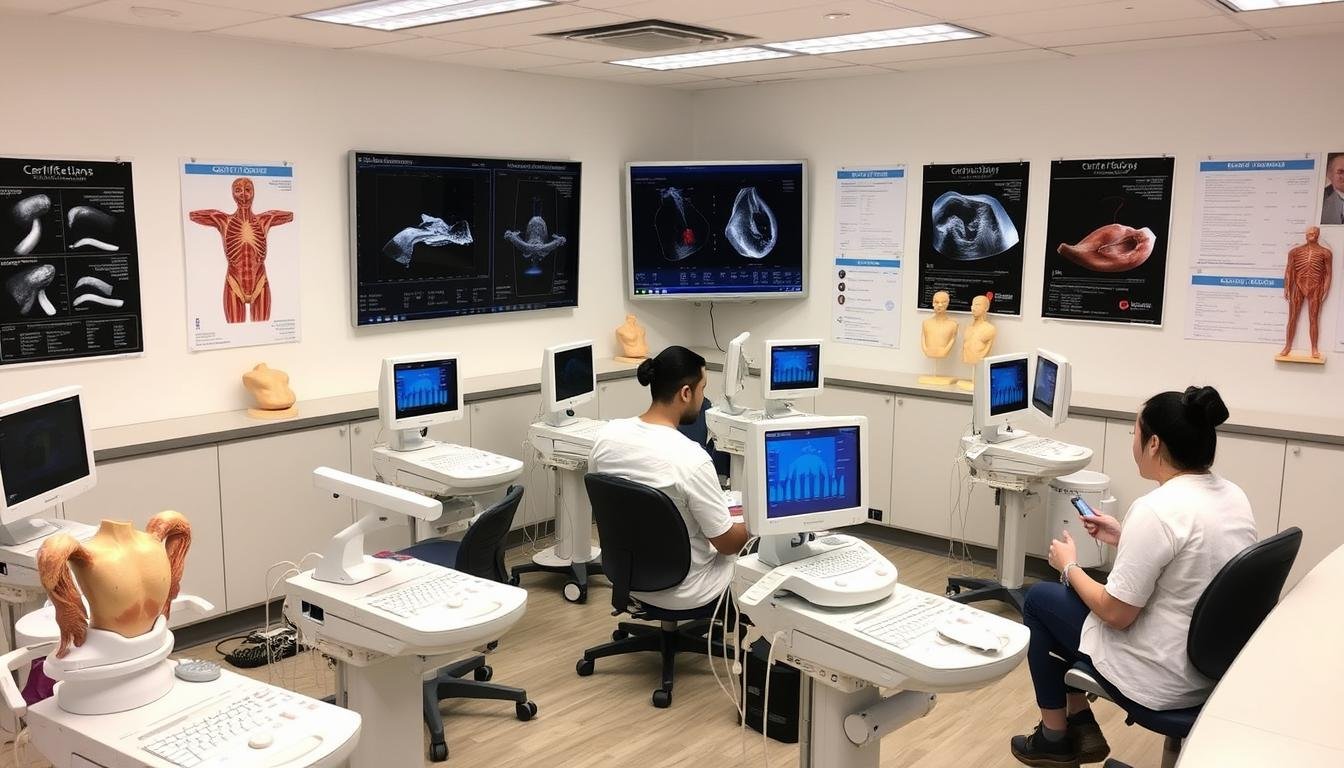Thinking about becoming an ultrasound technician? You might wonder how long the school takes. Programs can last from 12 to 48 months.
The duration depends on the degree and program you choose. Your state’s requirements also play a role.
A modern ultrasound tech classroom featuring advanced ultrasound machines, students practicing on mannequins, a bright and airy atmosphere with medical posters on the walls, a focused learning environment, soft lighting illuminating the room, and a diverse group of eager students engaged in hands-on training.
Ultrasound techs need special training in medical sonography. This involves using sound waves to create images inside the body.
Understanding program types can help you choose the right path. Consider your career goals when deciding on a program.
What is Ultrasound Technology?
Ultrasound uses sound waves to create images inside the body. It’s a safe way to see organs and tissues without radiation.
Doctors use ultrasound in many areas of medicine. Sonographers are experts who run the machines and help understand the images.
Ultrasound makes high-frequency sound waves that enter the body. These waves bounce back from body parts and create pictures.
The machine turns sound waves into electrical signals. These signals become moving images on a computer screen.
Ultrasound is safe, sound, and costs less than X-rays or MRIs. It’s used in hospitals, clinics, and doctor’s offices.
This technology is key for medical imaging and patient care. It helps doctors diagnose and track many health issues.
Types of Ultrasound Tech Programs
Ultrasound tech programs come in various forms. They include certificate, associate degree, and bachelor’s degree options.
Certificate programs take 1-2 years to finish. They focus on specific ultrasound specialties like cardiovascular or abdominal imaging.
These programs offer a quick path to the field. They are also cost-effective for students.
Associate degree programs usually last 2 years. They cover a wider range of ultrasound methods.
Many community colleges and technical schools offer these programs. This makes them easy to access for students.
Bachelor’s degree programs in ultrasound tech take 4 years. They provide a deep dive into the field.
These programs include specialized courses and clinical rotations. Graduates are ready for leadership roles or further specialization.
Factors Influencing Program Length
The duration of an ultrasound tech program varies based on several factors. Full-time students typically finish in 18-24 months.
Part-time students may take 24-36 months to graduate. Program length depends on credit hours and course load.
Clinical requirements also affect program duration. Most programs need 800 to 1,500 supervised clinical hours.
These hands-on experiences build essential skills and expertise. Clinical hours impact the overall program length.
Most students complete their training in 18 to 36 months. This depends on enrollment status and program requirements.
Knowing these factors helps make informed decisions about becoming an ultrasound technician.
Typical Duration of Ultrasound Tech Programs
Ultrasound tech programs can last from one to four years. The most common are associate’s degree programs, which take about two years.
Certificate programs usually take 12-18 months to finish. They teach basic ultrasound procedures and help students enter the field quickly.
Associate’s degree programs offer a more complete education. They cover advanced imaging techniques and patient care.
Students earn an Associate of Science (AS) or Associate of Applied Science (AAS) degree.
Bachelor’s degree programs take four years to complete. They teach medical theory, healthcare management, and specialized sonography skills.
All ultrasound tech students must complete clinical training hours. This helps them develop hands-on skills and prepare for the certification exam.
Curriculum Breakdown for Ultrasound Tech
Ultrasound tech degrees offer a complete curriculum. Students learn core subjects and get clinical training for this exciting career.
Core subjects include human anatomy, physiology, and medical terminology. Students also learn about patient care and ultrasound imaging principles.
The program teaches how ultrasound technology works. Students gain deep knowledge of diagnostic imaging equipment and techniques.
Clinical training is a key part of ultrasound tech programs. Students work with experienced professionals in hospitals, clinics, and imaging centers.
This hands-on experience helps apply classroom knowledge. Students learn to perform ultrasound exams skillfully.
The curriculum combines theory and practice. It prepares students to be confident healthcare professionals.
Graduates can provide quality patient care. They’re ready to contribute to diagnostic imaging.
Accreditation and Its Importance
Accreditation is vital when picking an ultrasound tech program. Accredited programs meet or exceed industry standards set by recognized bodies.
The CAAHEP is a leading accrediting body for ultrasound tech programs. These programs provide comprehensive training for students.
Graduates of accredited programs are more attractive to employers. They show commitment to education and professional growth.
Accreditation maintains the integrity of the ultrasound tech profession. It ensures graduates are ready to provide high-quality patient care.
Look for programs accredited by recognized bodies like CAAHEP. This ensures a well-rounded education and opens doors to career opportunities.

Licensing and Certification Requirements
Ultrasound technicians need specific licenses and certifications to work. The American Registry for Diagnostic Medical Sonography (ARDMS) offers several essential certifications.
The leading ARDMS certification is the Registered Diagnostic Medical Sonographer (RDMS) credential. To get it, you need education, experience, and to pass an exam.
The RDMS covers many ultrasound areas. These include abdominal, cardiac, and obstetric imaging.
Some states have their own rules for ultrasound technicians. It’s essential to check your state’s guidelines before starting work.
Getting the proper licenses and certifications can boost your career. It shows your skills and opens up new job chances.
Financial Considerations for Attending School
Becoming an ultrasound technician requires investing in education. The costs vary by program and school.
Tuition typically ranges from $10,000 to $30,000. The average cost is around $20,000.
Many financial aid options can help pay for ultrasound tech school. Students may qualify for federal and state grants.
The Pell Grant offers up to $6,495 yearly. Schools also provide scholarships and financial aid for tuition.
Student loans, both federal and private, are another funding option. These help cover remaining costs after grants and scholarships.
Research loan options carefully. Look for the best terms and interest rates.
Explore financial aid to make education more affordable. Planning your budget is key.
The proper education leads to a rewarding ultrasound technician career. Invest wisely in your future.
Job Outlook for Ultrasound Technicians
Ultrasound technicians have a bright future ahead. The field is growing fast due to an aging population.
The Bureau of Labor Statistics predicts 17% job growth from 2021 to 2031. This is much faster than average for all jobs.
Many places need skilled ultrasound technicians. Hospitals, clinics, and doctors’ offices are always looking for new talent.
Baby boomers need more healthcare services. This includes ultrasound imaging, creating more career opportunities.
Some areas of ultrasound are growing even faster. Cardiovascular and obstetric ultrasound are in high demand.
Heart disease and pregnancy-related conditions are on the rise. This increases the need for specialized ultrasound services.
The ultrasound field offers many chances for success. With the proper education, you can thrive in this growing industry.
Getting certified can help you stand out. It’s a great way to start your career in healthcare.
Frequently Asked Questions
Curious about ultrasound tech programs? Let’s answer some common questions to help you decide.
Program length varies. In-person programs usually take 18 to 24 months.
Online programs can be completed in 12 to 18 months.
The curriculum covers anatomy, physiology, and patient care. It also includes hands-on training in ultrasound imaging techniques.
Online and in-person programs may differ in coursework and clinical hours. Research program details carefully before choosing.
Accredited programs ensure you meet educational and clinical requirements. They prepare you to become a licensed ultrasound technician.
An educational setting with a modern ultrasound classroom featuring students practicing on ultrasound machines, anatomical models displayed around the room, certification posters on the walls, and educational materials related to ultrasound technology, creating an atmosphere of learning and professionalism.
These answers should help you understand ultrasound tech programs better. Choose the path that fits your goals and preferences.
Next Steps After Graduation
Congrats on finishing your ultrasound tech program! Your journey in medical sonography is just beginning.
The job market offers many chances for skilled ultrasound technicians. You can work in hospitals, clinics, or private practices.
Make a great resume to show off your skills. Look for jobs online and at industry events.
Your education has given you the know-how to do well. Be confident in showing what you can do.
Keep learning to grow in your career. Try getting more certifications or going to workshops.
You could even get a bachelor’s or master’s degree. This can lead to better jobs and more money.
Ultrasound tech is constantly changing. Keep learning to stay on top of new things.
FAQ
How long does it take to become an ultrasound technician?
Ultrasound tech programs can take 12 to 48 months to complete. The duration depends on the program type and enrollment status.
Certificate programs last 12-18 months. Associate degrees take about 24 months. Bachelor’s degrees require 36-48 months.
What are the different types of ultrasound tech programs?
There are three main types of ultrasound tech programs. These include certificate, associate degree, and bachelor’s degree programs.
Certificates focus on specific training. Associate degrees offer a broader curriculum. Bachelor’s degrees provide in-depth education and clinical experience.
What factors affect the length of an ultrasound tech program?
Program length depends on enrollment status and clinical training requirements. Full-time students usually finish faster than part-time students.
Programs with more clinical components may take longer to complete.
Do online ultrasound tech programs have the same duration as in-person programs?
Online and in-person ultrasound tech programs usually have similar durations. Online learning offers more flexibility for students.
This flexibility may allow some to complete their studies faster.
What is the typical curriculum for an ultrasound tech program?
Ultrasound tech programs mix classroom learning with hands-on clinical training. Classes cover anatomy, physiology, medical terms, and imaging techniques.
The clinical part gives real-world experience in healthcare settings.
What is the job outlook for ultrasound technicians?
The job outlook for ultrasound technicians is auspicious. The field is expected to grow 14% between 2019 and 2029.
This growth is due to an aging population and increased demand for imaging.
You may also read:How Long Does It Take to Become a Surgical Tech


